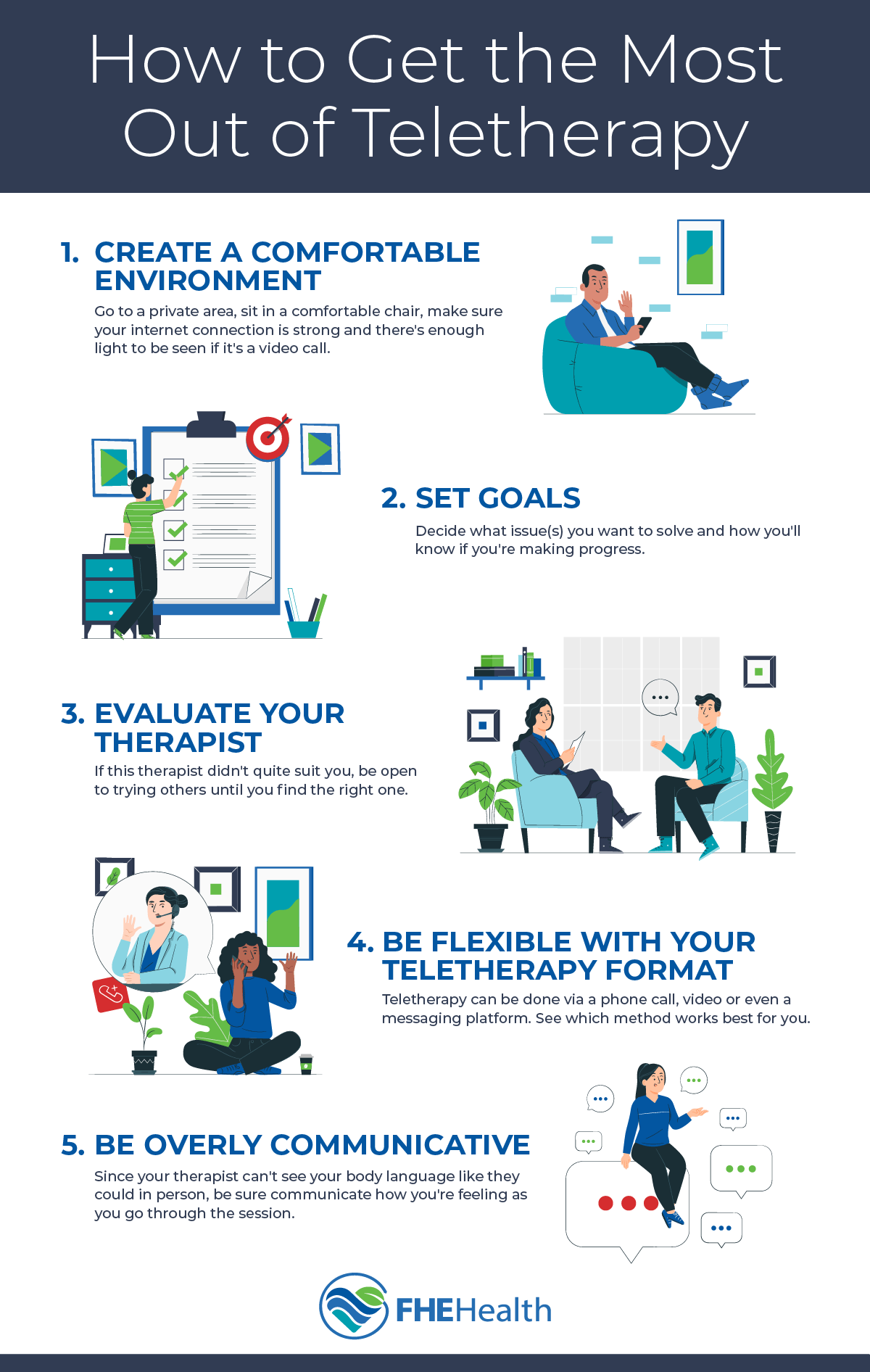
Teletherapy makes therapy more accessible and convenient for people who struggle to attend in-person appointments. Teletherapy has many benefits, but it differs significantly from traditional therapy sessions. It’s vital to know what steps to take to get the most out of your appointments and make them just as valuable as in-person sessions. Keep reading for five teletherapy tips that can help you in your therapy journey.
What Is Teletherapy?
Teletherapy, also known as e-therapy or online therapy, is the practice of participating in counseling sessions remotely via phone, video, email or messaging apps.

Benefits of Teletherapy
Teletherapy shouldn’t be viewed as a secondary, lesser choice. If you approach it with the right attitude and perspective, teletherapy is as valuable as in-person therapy. Here are some of the benefits it can provide:
- Cost-effectiveness. Teletherapy is often more affordable than in-person therapy because the therapist or clinic doesn’t have to pay for office space and therefore won’t pass that cost on to clients.
- Accessibility. People living in small towns or remote areas may not have therapists nearby. Teletherapy makes therapy accessible to anyone and offers people more options. For example, finding a therapist with a specialized background will be much easier if you’re not limited to your local area.
- Convenience. Some people have jam-packed daily schedules and can’t imagine carving out the time to drive to the provider’s office, have the therapy session and drive home. A telehealth appointment can fit into your day at any convenient time, such as during your lunch break or late in the evening.
- Destigmatizing. Although the perception around mental health has changed by leaps and bounds, some stigma around mental health still exists. A 2021 Onepol survey found 47% of people believe seeking therapy is a sign of weakness. With perceptions like this, some may avoid therapy simply because they don’t want to be seen walking into a therapist’s office. Telehealth solves this problem and allows people to get help without fear of being spotted.
- Fewer interruptions. When you get sick or there’s bad weather such as snow, you may be tempted to cancel your in-person session despite really needing it. With teletherapy, illness or travel conditions won’t stop you from attending your therapy session.
5 Teletherapy Tips
Maximizing teletherapy takes some effort. You can set yourself up for a successful session by taking specific steps. Here are five teletherapy tips to help you get the most out of your virtual appointments.
1. Create a Comfortable Environment
When it comes to virtual counseling advice, make sure you create a therapy-friendly space in your home for your sessions. When you’re in a therapy session, you must feel comfortable enough to be vulnerable. If your physical environment isn’t set up right, you might be distracted or unwilling to dive deep into your therapy practice. Here’s how you can set up the right environment for your teletherapy appointment:
- Ask for privacy. If you live with a partner or family members, ask them to leave the area during your appointment, or go to a private area of the house.
- Sit in a comfortable chair so you’re relaxed.
- Ensure you have a strong internet connection so your conversation isn’t interrupted.
- If you’re doing a video call, ensure there’s enough light for you and the therapist to see each other clearly.
2. Set Goals
There’s likely a reason you decided to see a therapist. You probably have issues you want to address or resolve. It’s essential to set goals for your therapy sessions so you know if you’re making progress. Whether you’re doing in-person or virtual therapy, setting goals and reviewing them is a critical part of the process.
3. Evaluate Your Therapist
Make sure to distinguish your experience with your therapist from your experience with teletherapy. If you try a session and don’t like it, acknowledge it may have been the therapist you didn’t like, not the teletherapy session itself. Allow yourself to try a few therapists until you find the one who’s right for you.
Additionally, therapists can have different online therapy strategies for their sessions, so find a counselor who suits your comfort level and needs.
4. Be Flexible With Your Teletherapy Format
Teletherapy can be done via a phone call, video or even a messaging platform. Be open to trying all these options to explore which method works best for you.
5. Be Overly Communicative
Therapists pick up on body language when you’re talking. Without even realizing it, your body language gives an indication of how you really feel. With teletherapy, this is harder for the therapist to notice. You can help your therapist by being overly communicative. Even if you think it’s obvious, state how you’re feeling as you go through the session. This will help your counselor be in tune with you and respond to you as needed.
Teletherapy Styles
Similar to in-person sessions, teletherapy can take many different forms. You can attend one-on-one sessions, family counseling, couples counseling and group therapy via teletherapy.
Is Teletherapy for Everyone?
Teletherapy is a great option that can work for many people. However, individuals struggling with severe mental health conditions likely will benefit more from one-on-one sessions. For example, those in the early stages of substance abuse addiction therapy should most likely seek help at a treatment center. However, once someone is further along in their recovery journey, they may choose to switch to teletherapy for the convenience and other benefits.
FHE Health Is Here for You
Therapy is a powerful tool that can improve your life. Whether you’re struggling with substance abuse or a mental health condition, FHE Health can help. Our trained and experienced staff will give you the tools you need to return to feeling like your old self. Contact us today to learn more about what FHE Health can do for you.






